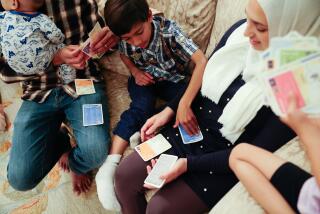Long-ago good deed celebrated
- Share via
The way Mercedes Virgili Faraoni sees it, the choice was simple.
“How can you refuse people in need?” she said. “In the end, we acted from our hearts.”
So it was that Faraoni’s family, Italian Catholics living in the tiny village of Secchiano during World War II, hid a Jewish family of three from the Nazis.
At first they put up the refugees in their house; then, when that became too dangerous, in an abandoned room of a school. With the help of the whole village, they fed them, clothed them and kept them safe.
When the Nazis got too close, the Catholics took their charges to church. And when Faraoni’s father got arrested, he never spilled the truth -- even when tortured by his captors.
In the end, both families survived. On Saturday they were reunited at another house of worship; this time an Irvine temple for the bar mitzvah of a boy who might not have been.
“I’m honored to be here,” said Faraoni, 75. “We had to be together again.”
Said Charlotte Hauptman, 68: “I wish my parents could be here to see it.”
The two were girls when they met in 1942. Faced with certain death in Nazi concentration camps, Hauptman’s parents had fled their native Germany for fascist Italy, where she was born. With the help of partisans and sympathetic families, they hid out in forests and slept in barns. Eventually, they arrived in Secchiano, where about 200 villagers lived.
“Everyone knew,” Hauptman recalls, “and everyone helped.”
Faraoni and her family took them in. The parish priest helped comfort their souls. And the miller’s wife brought them food every day.
When Hauptman’s mother could no longer pay for it, the miller’s wife -- to help her save face -- accepted a wedding ring in exchange for the care.
On the woman’s deathbed many years later, she left the ring to her son with strict instructions that it be returned. Eventually, carried across the ocean by a young couple from Secchiano, it found its way back to Hauptman’s mother, who’d been saved.
By then the war was long over and the Jewish family was thriving in the U.S. Hauptman’s parents died in the 1970s. She got married and raised several children. She didn’t see Faraoni again until visiting Italy after 40 years.
“The whole village was so happy to see us,” she recalls. “I couldn’t believe it; it was like I came out of a void.”
That was in 1984, before her grandson was born.
This year Jacob Hauptman turned 13, an important coming-of-age passage for Jewish children. Following the custom, his parents gave him a bar mitzvah signifying passage of the religion across generations.
“I’m here so our story can go on,” said Mercedes Faraoni, who’d flown from Italy with a daughter, son-in-law and two grandchildren of her own.
Rabbi Richard Steinberg, presiding over the event at Congregation Shir Ha-Ma’alot, addressed them from the podium. “Your family stood tall in a time of evil and darkness to bring light to the world,” he said. “What you did was a good deed beyond good deeds; if not for [you], Jacob wouldn’t be here today.”
Jacob understood.
“I hope I can go to Italy someday to see them,” he said, referring to Faraoni’s descendants of his generation. “It would be fun to keep in touch with them; we’ll just keep it moving on.”
Faraoni’s granddaughter, 14-year-old Gaelle Esnault, shared his sense of purpose.
“I think it’s beautiful,” she said of the story she’d been told all her life. “It shouldn’t be lost when the grandmothers are gone.”
--
More to Read
Sign up for Essential California
The most important California stories and recommendations in your inbox every morning.
You may occasionally receive promotional content from the Los Angeles Times.












